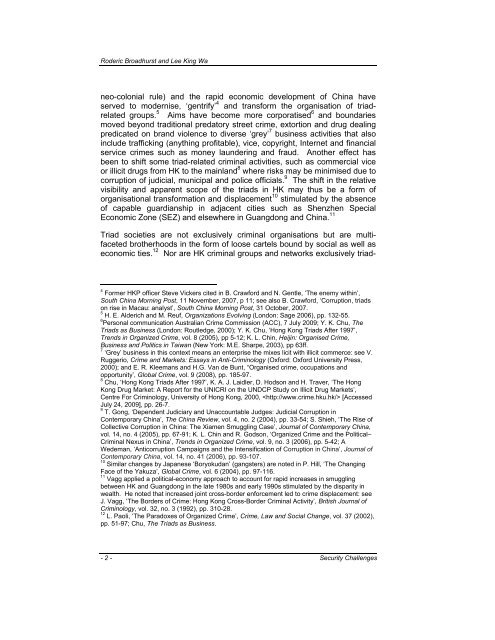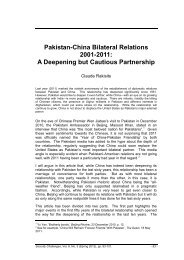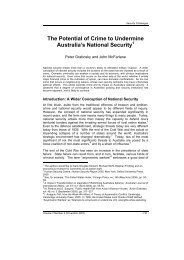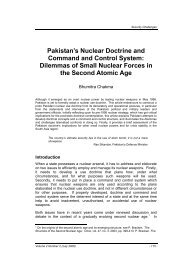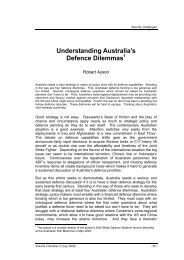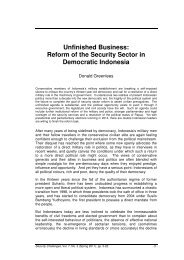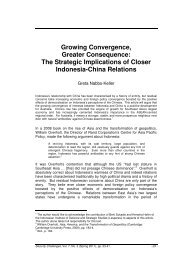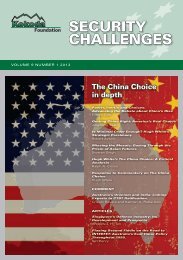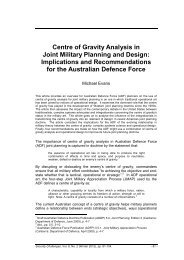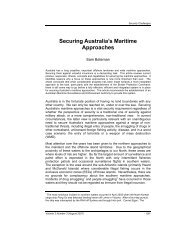The Transformation of Triad - Security Challenges
The Transformation of Triad - Security Challenges
The Transformation of Triad - Security Challenges
You also want an ePaper? Increase the reach of your titles
YUMPU automatically turns print PDFs into web optimized ePapers that Google loves.
Roderic Broadhurst and Lee King Wa<br />
neo-colonial rule) and the rapid economic development <strong>of</strong> China have<br />
served to modernise, ‘gentrify’ 4 and transform the organisation <strong>of</strong> triadrelated<br />
groups. 5 Aims have become more corporatised 6 and boundaries<br />
moved beyond traditional predatory street crime, extortion and drug dealing<br />
predicated on brand violence to diverse ‘grey’ 7 business activities that also<br />
include trafficking (anything pr<strong>of</strong>itable), vice, copyright, Internet and financial<br />
service crimes such as money laundering and fraud. Another effect has<br />
been to shift some triad-related criminal activities, such as commercial vice<br />
or illicit drugs from HK to the mainland 8 where risks may be minimised due to<br />
corruption <strong>of</strong> judicial, municipal and police <strong>of</strong>ficials. 9 <strong>The</strong> shift in the relative<br />
visibility and apparent scope <strong>of</strong> the triads in HK may thus be a form <strong>of</strong><br />
organisational transformation and displacement 10 stimulated by the absence<br />
<strong>of</strong> capable guardianship in adjacent cities such as Shenzhen Special<br />
Economic Zone (SEZ) and elsewhere in Guangdong and China. 11<br />
<strong>Triad</strong> societies are not exclusively criminal organisations but are multifaceted<br />
brotherhoods in the form <strong>of</strong> loose cartels bound by social as well as<br />
economic ties. 12 Nor are HK criminal groups and networks exclusively triad-<br />
4<br />
Former HKP <strong>of</strong>ficer Steve Vickers cited in B. Crawford and N. Gentle, ‘<strong>The</strong> enemy within’,<br />
South China Morning Post, 11 November, 2007, p 11; see also B. Crawford, ‘Corruption, triads<br />
on rise in Macau: analyst’, South China Morning Post, 31 October, 2007.<br />
5<br />
H. E. Alderich and M. Reuf, Organizations Evolving (London: Sage 2006), pp. 132-55.<br />
6<br />
Personal communication Australian Crime Commission (ACC), 7 July 2009; Y. K. Chu, <strong>The</strong><br />
<strong>Triad</strong>s as Business (London: Routledge, 2000); Y. K. Chu, ‘Hong Kong <strong>Triad</strong>s After 1997’,<br />
Trends in Organized Crime, vol. 8 (2005), pp 5-12; K. L. Chin, Heijin: Organised Crime,<br />
Business and Politics in Taiwan (New York: M.E. Sharpe, 2003), pp 63ff.<br />
7<br />
‘Grey’ business in this context means an enterprise the mixes licit with illicit commerce: see V.<br />
Ruggerio, Crime and Markets: Essays in Anti-Criminology (Oxford: Oxford University Press,<br />
2000); and E. R. Kleemans and H.G. Van de Bunt, “Organised crime, occupations and<br />
opportunity’, Global Crime, vol. 9 (2008), pp. 185-97.<br />
8<br />
Chu, ‘Hong Kong <strong>Triad</strong>s After 1997’, K. A. J. Laidler, D. Hodson and H. Traver, ‘<strong>The</strong> Hong<br />
Kong Drug Market: A Report for the UNICRI on the UNDCP Study on Illicit Drug Markets’,<br />
Centre For Criminology, University <strong>of</strong> Hong Kong, 2000, [Accessed<br />
July 24, 2009], pp. 26-7.<br />
9<br />
T. Gong, ‘Dependent Judiciary and Unaccountable Judges: Judicial Corruption in<br />
Contemporary China’, <strong>The</strong> China Review, vol. 4, no. 2 (2004), pp. 33-54; S. Shieh, ‘<strong>The</strong> Rise <strong>of</strong><br />
Collective Corruption in China: <strong>The</strong> Xiamen Smuggling Case’, Journal <strong>of</strong> Contemporary China,<br />
vol. 14, no. 4 (2005), pp. 67-91; K. L. Chin and R. Godson, ‘Organized Crime and the Political–<br />
Criminal Nexus in China’, Trends in Organized Crime, vol. 9, no. 3 (2006), pp. 5-42; A<br />
Wedeman, ‘Anticorruption Campaigns and the Intensification <strong>of</strong> Corruption in China’, Journal <strong>of</strong><br />
Contemporary China, vol. 14, no. 41 (2006), pp. 93-107.<br />
10<br />
Similar changes by Japanese ‘Boryokudan’ (gangsters) are noted in P. Hill, ‘<strong>The</strong> Changing<br />
Face <strong>of</strong> the Yakuza’, Global Crime, vol. 6 (2004), pp. 97-116.<br />
11<br />
Vagg applied a political-economy approach to account for rapid increases in smuggling<br />
between HK and Guangdong in the late 1980s and early 1990s stimulated by the disparity in<br />
wealth. He noted that increased joint cross-border enforcement led to crime displacement: see<br />
J. Vagg, ‘<strong>The</strong> Borders <strong>of</strong> Crime: Hong Kong Cross-Border Criminal Activity’, British Journal <strong>of</strong><br />
Criminology, vol. 32, no. 3 (1992), pp. 310-28.<br />
12<br />
L. Paoli, ‘<strong>The</strong> Paradoxes <strong>of</strong> Organized Crime’, Crime, Law and Social Change, vol. 37 (2002),<br />
pp. 51-97; Chu, <strong>The</strong> <strong>Triad</strong>s as Business.<br />
- 2 - <strong>Security</strong> <strong>Challenges</strong>


